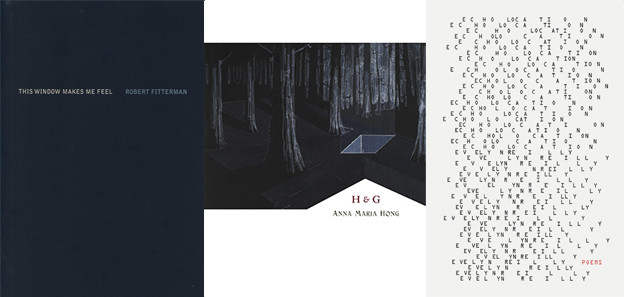
Fables, selfhood, and affect
Orchid Tierney

Reviews editor Orchid Tierney returns with capsule reviews of three timely poetry titles.
This Window Makes Me Feel, Rob Fitterman (Ugly Duckling Press, 2018)
This Window Makes Me Feel is a window into the quotidian articulations of collective desire and affect. Fitterman’s skillful editing of web language instigates an implosion of history and the everyday, while the catastrophe of 9/11 looms unvocalized in the background. With contradictory lines like “This window makes me feel like I’m protected” and “This window makes me feel like I’m a rabbit being hunted,” this long poem aptly demonstrates that the noisy polyvocality of the digital world remains tersely conversant with the real-world scales of human tragedy.
H & G, Anna Maria Hong (Sidebrow Books, 2018)
“G. and H. let the Witch’s house burn,” writes the narrator, “run out of the house … until they get back to their Father’s house, which they immediately set on fire.” H & G takes the axe to the narrative of Hansel and Gretel to expose its grainy tropes of “inherited misogyny” and abusive enchantment. “Our Blood-Mother went to the hospital, eyes full of self-pity, and asked my Brother for rent money,” the narrator writes, “She blamed her actions on our Father.” Hong’s “Hansel and Gretel” is a novel with multiple beginnings and endings, where G is a “little Korean American Fräulein” in a story about parental failures and vengeance — maybe even forgiveness. “You can choose a lighter path,” as the narrator suggests, “go through the door with nothing on your person, nothing on your back.”
Echolocation, Evelyn Reilly (Roof Books, 2018)
In Evelyn Reilly’s Echolocation, the self is posthuman, multiple, and full of vulnerable animality. After all, “why should our bodies end at our skin?” Blending citations from writers like Donna Haraway, Giorgio Agamben, and Hannah Veltan, Echolocation meditates on our fragile anthropocenic condition, where personhood and plurality simultaneously sunder and cohere the human and natural worlds. “That human / nature / is civic,” writes Reilly. And: “Early evidence / of the innovation of milking / frequently includes figures / of a cow weeping.” Spinning lines with urgency of thought, Echolocation is vital reading for poets and scholars in the field of ecopoetics today.